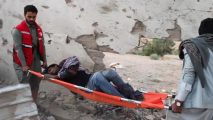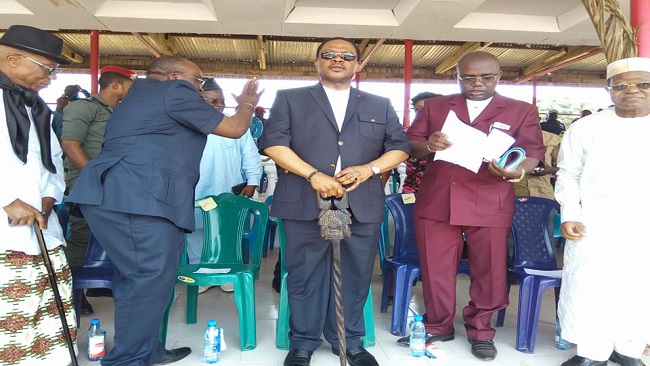Categories
Recent Posts
- Football: Dembele goal gives PSG narrow advantage over Arsenal in Champions League
- US: Trump addressing rally in Michigan as he marks 100 days in office
- Vatican: Conclave to elect new pope will start on May 7
- Namibian minister sacked after being accused of rape
- Dozens of African migrants killed in US strike on Yemen
Archives
- April 2025
- March 2025
- February 2025
- January 2025
- December 2024
- November 2024
- October 2024
- September 2024
- August 2024
- July 2024
- June 2024
- May 2024
- April 2024
- March 2024
- February 2024
- January 2024
- December 2023
- November 2023
- October 2023
- September 2023
- August 2023
- July 2023
- June 2023
- May 2023
- April 2023
- March 2023
- February 2023
- January 2023
- December 2022
- November 2022
- October 2022
- September 2022
- August 2022
- July 2022
- June 2022
- May 2022
- April 2022
- March 2022
- February 2022
- January 2022
- December 2021
- November 2021
- October 2021
- September 2021
- August 2021
- July 2021
- June 2021
- May 2021
- April 2021
- March 2021
- February 2021
- January 2021
- December 2020
- November 2020
- October 2020
- September 2020
- August 2020
- July 2020
- June 2020
- May 2020
- April 2020
- March 2020
- February 2020
- January 2020
- December 2019
- November 2019
- October 2019
- September 2019
- August 2019
- July 2019
- June 2019
- May 2019
- April 2019
- March 2019
- February 2019
- January 2019
- December 2018
- November 2018
- October 2018
- September 2018
- August 2018
- July 2018
- June 2018
- May 2018
- April 2018
- March 2018
- February 2018
- January 2018
- December 2017
- November 2017
- October 2017
- September 2017
- August 2017
- July 2017
- June 2017
- May 2017
- April 2017
- March 2017
- February 2017
- January 2017
- December 2016
- November 2016
- October 2016
- September 2016
- August 2016
- July 2016
- June 2016
Featured
Most Commented Posts
 4 Anglophone detainees killed in Yaounde
4 Anglophone detainees killed in Yaounde
18 comments Chantal Biya says she will return to Cameroon if General Ivo Yenwo, Martin Belinga Eboutou and Ferdinand Ngoh Ngoh are sacked
Chantal Biya says she will return to Cameroon if General Ivo Yenwo, Martin Belinga Eboutou and Ferdinand Ngoh Ngoh are sacked
13 comments The Anglophone Problem – When Facts don’t Lie
The Anglophone Problem – When Facts don’t Lie
12 comments Anglophone Nationalism: Barrister Eyambe says “hidden plans are at work”
Anglophone Nationalism: Barrister Eyambe says “hidden plans are at work”
12 comments Largest wave of arrest by BIR in Bamenda
Largest wave of arrest by BIR in Bamenda
10 comments
Latest Tweets
Featured
-

Football: Dembele goal gives PSG narrow advantage over Arsenal in Champions League
-

US: Trump addressing rally in Michigan as he marks 100 days in office
-

Vatican: Conclave to elect new pope will start on May 7
-

Namibian minister sacked after being accused of rape
-

Dozens of African migrants killed in US strike on Yemen
-

Manyu Division: A new path is possible
-

Who will be the next pope? Key candidates in an unpredictable process
© Cameroon Concord News 2025





18, October 2017
Yaounde: West and Central African police meet to counter escalating terror threat 0
With Central and West Africa combating some of the world’s deadliest terrorist organisations Interpol brought police chiefs and counter-terrorism experts from the regions together to help streamline and enhance ongoing law enforcement efforts.
A two-day high-level meeting earlier this month in Yaoundé, Cameroon – the first of its kind – gave delegates from 21 countries an opportunity express their needs and be briefed on areas where Interpol can provide additional support.
This includes assistance in identifying and locating members of known transnational terrorist groups and supporters; helping countries bolster security at national and regional borders; preventing and combating the use of cyberspace for terrorist purposes; monitoring and detecting trafficking of weapons and chemical and explosive materials; and tracking and curbing the financial flows of terrorist organisations.
Opening the conference, René Emmanuel Sadi, Cameroon Minister of Territorial Administration and Decentralisation said no region was immune to the threat of terrorism which required a unified and global response.
“The complexity of the challenges, the consequences of security gaps and exploitation of loopholes by terrorists requires a new kind of cross-border preparedness and response by police,” Interpol Secretary General Jürgen Stock said.
“The terrorist threat faced by central and west Africa is not only severe, but is escalating in frequency and impact. “We must build on national and regional expertise to further strengthen global security architecture if we are to develop a unified and effective response,” added the Interpol Chief, who highlighted the development of Interpol’s Regional Counter Terrorism Nodes (RCTNs) to achieve balance.
Based in Interpol offices, the RCTNs will enable counter-terrorism experts to sit side-by-side, enabling direct information exchange and rapid response capabilities to terrorist threats, backed by the Global Counter-Terrorism Centre at Interpol General Secretariat headquarters in France.
As part of a project to expand and modernise I-24/7, Interpol’s global communications network, Stock announced a EUR two million project to renew equipment in Interpol National Central Bureaus (NCBs) across Africa.
The results which can be achieved when frontline officers have access to Interpol global databases were recently highlighted by the arrest of two foreign terrorist fighters who were the subject of Red Notices, following checks against Interpol databases by West African border officials.
Increased exchange of identifying information is also a key issue for discussion. Biometric data, such as photos, fingerprints and DNA profiles, shared via Interpol have already led to positive identification of terrorists around the world, including via facial recognition.
Source: Defenseweb